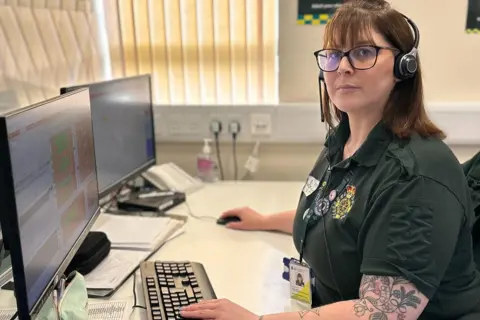'999 caller described how he would murder me'
 Welsh Ambulance Service
Welsh Ambulance ServiceEmergency workers in Wales have revealed the shocking abuse they receive, including murder threats, from people they are trying to help.
A 999 call handler said one man told her "in graphic detail" how he would cut her into pieces.
Recent data showed there were 1,964 incidents of verbal abuse against Welsh emergency workers between April 2019 and December 2023.
More than half (52%) of the victims were medical workers, while more than a third (37%) were police workers.
Abbie Williams, a Welsh Ambulance Service call taker supervisor in Cwmbran, Torfaen, said she received her first - and worst - abusive call during the pandemic.
"The caller said he'd cut me up into pieces, even going into detail about which body part he'd start with and what tools he'd use to do it," she said.
"He described in graphic detail how he'd murder me – that one will always stay with me.
"Other callers have said they hope I crash my car on the way home, or that I never get to see my family again."
Emma Worrall, a 999 call taker in Llangunnor, Carmarthenshire, said: "One caller said he was going to stab me in the neck as I left work.
"When I started this role four years ago, verbal abuse was rare, but now it's a daily occurrence, especially if there are long waits for an ambulance.
"It's to the point now where we actually celebrate those callers who are pleasant and thank us for the great work we do.
"When you tell someone it might be six to eight hours for an ambulance, it's like the flick of a switch."
 Welsh Ambulance Service
Welsh Ambulance ServiceEmergency service bosses said they were concerned for staff's mental health, as such abuse can take its toll.
Jason Killens, chief executive of the Welsh Ambulance Service, said staff "receive horrid verbal abuse on a daily basis".
He added this can have a "devastating and long-term emotional impact" meaning some staff "have no choice but to leave the role".
"We understand that when people call us, they might be frightened, in shock and upset, but that's not an excuse to abuse our staff," he said.
Pam Kelly, Chief Constable of Gwent Police, said: "Nobody should expect to be assaulted - either physically or verbally - when they go to work, whether you work for the emergency services or otherwise.
"It saddens me to hear of these terrible encounters that my staff and those across the emergency services have experienced when they were assaulted by the public in the line of duty.
"This behaviour makes our roles more challenging, and we will support any officer or emergency service worker who has experienced this disgraceful abuse while also taking firm actions against those responsible."
Efforts to tackle abuse
There have been numerous efforts to tackle abuse against emergency workers.
In 2018, the maximum custodial sentence under the Assault on Emergency Workers (Offences) Act which could be applied by the magistrates' court was doubled from six months to 12 months in prison.
In 2022, the maximum custodial sentence which could be applied by the crown court was increased to two years.
The emergency services in Wales has run the With Us, Not Against Us campaign since 2021 in a bid to reduce assaults.
In May, the Anti-Violence Collaborative Wales reaffirmed its commitment to reduce and respond to incidents of violence and aggression against NHS staff and emergency workers.
